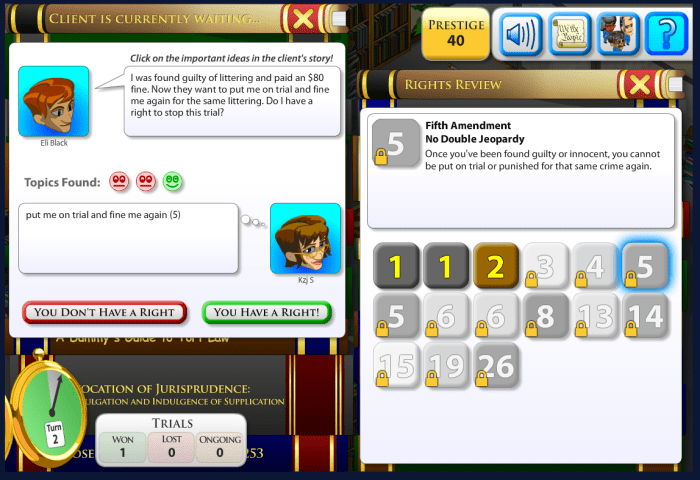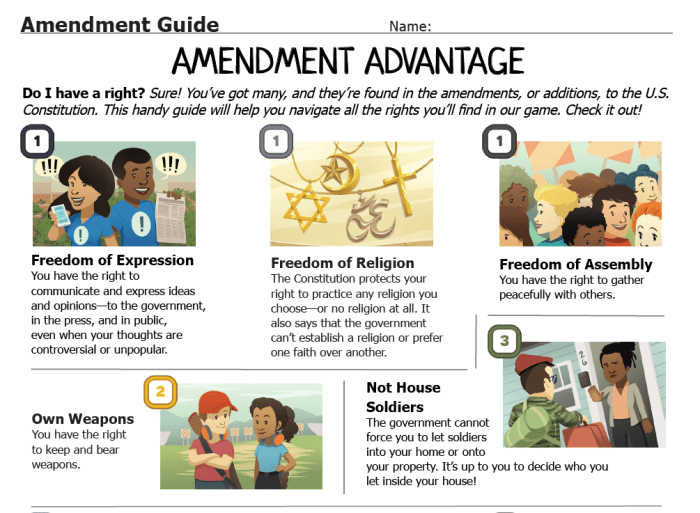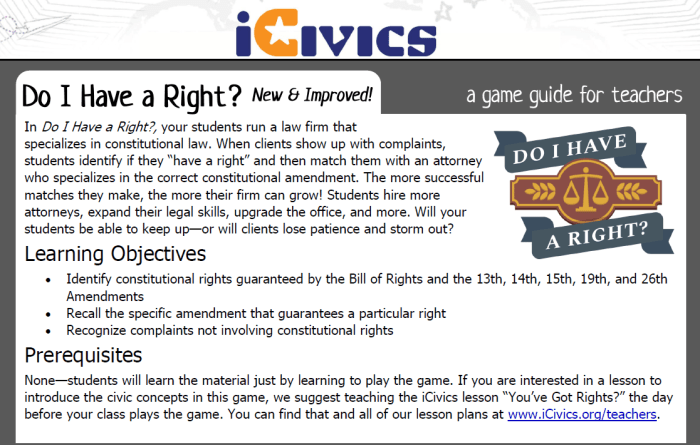Do i have a right icivics answer key – Embark on a journey of legal discovery with “Do I Have a Right?” from iCivics, an interactive activity that empowers you to navigate the complexities of your rights and freedoms. Unveil the secrets of the answer key to unlock a deeper understanding of the legal framework that governs our society.
Delve into the heart of American democracy as we explore the fundamental rights and liberties enshrined in the Constitution. Understand the significance of these principles and how they shape our daily lives.
Introduction to “Do I Have a Right” (ICivics Answer Key)

The “Do I Have a Right” activity from iCivics is an interactive simulation that teaches students about the Bill of Rights and the rights guaranteed to all Americans. The activity is designed to help students understand the importance of these rights and how they are protected by the Constitution.
The answer key for the “Do I Have a Right” activity provides detailed explanations of each of the questions in the activity. The answer key also includes a discussion of the Bill of Rights and the history of the rights guaranteed by the Constitution.
Structure and Format of the Answer Key, Do i have a right icivics answer key
The answer key for the “Do I Have a Right” activity is organized into three sections:
- The Bill of Rights: This section provides a brief overview of the Bill of Rights and the rights guaranteed by the Constitution.
- The Activity Questions: This section provides detailed explanations of each of the questions in the activity.
- Additional Resources: This section provides links to additional resources that students can use to learn more about the Bill of Rights and the rights guaranteed by the Constitution.
Understanding the Rights and Freedoms

The “Do I Have a Right” activity introduces students to key rights and freedoms protected by the U.S. Constitution. These rights are fundamental to American democracy and ensure that individuals are treated fairly and justly.
The activity covers the following rights and freedoms:
- Freedom of speech
- Freedom of religion
- Freedom of the press
- Right to assemble
- Right to petition the government
- Equal protection under the law
li>Due process of law
These rights are essential to a free and democratic society. They allow individuals to express their opinions, practice their religion, and participate in government. They also protect individuals from arbitrary or unfair treatment by the government.
Analyzing the Scenarios

The “Do I Have a Right?” activity presents various scenarios that explore the complexities of rights and freedoms in different contexts. Each scenario raises unique legal and ethical considerations, prompting students to examine the boundaries of individual liberties and societal responsibilities.
Scenario 1: Freedom of Speech
One scenario involves a student who is suspended from school for expressing controversial views in a social media post. This raises questions about the limits of free speech in educational settings, the balance between student rights and school authority, and the potential consequences of online expression.
Scenario 2: Right to Privacy
Another scenario examines the use of surveillance cameras in public spaces. Students must consider the tension between public safety and individual privacy, the legal framework governing data collection and storage, and the ethical implications of widespread surveillance.
Scenario 3: Right to Fair Trial
A third scenario presents a case where a defendant is convicted based on evidence obtained through a questionable search. This raises concerns about the due process rights of individuals, the role of law enforcement in upholding constitutional principles, and the importance of fair and impartial trials.
Scenario 4: Right to Vote
Finally, a scenario explores the issue of voter suppression and its impact on democratic participation. Students must analyze the legal and ethical implications of laws and practices that restrict access to voting, the role of government in ensuring equal voting rights, and the consequences of disenfranchisement.
Applying the Answer Key: Do I Have A Right Icivics Answer Key

The answer key provided in the “Do I Have a Right” module of iCivics serves as a valuable tool to assess understanding of the scenarios presented. By comparing responses to the key, learners can identify correct answers and gain insights into the underlying rationale.
Analyzing the Answer Key
To effectively utilize the answer key, learners should first carefully read and comprehend each scenario. The key provides answers for both “yes” or “no” responses, along with supporting evidence. Learners should match their responses to the key and evaluate the reasoning behind each answer.
For instance, in the scenario involving a student’s suspension for wearing a political t-shirt, the answer key indicates a “no” response, citing the First Amendment protection of free speech. This explanation clarifies that schools cannot restrict student expression unless it causes a substantial disruption to the educational environment.
Potential Areas of Disagreement or Debate
While the answer key provides clear guidance, there may be instances where learners have differing interpretations or opinions on certain scenarios. These areas of disagreement or debate can stimulate further discussion and critical thinking.
For example, the scenario involving a police officer searching a student’s backpack without a warrant raises questions about the Fourth Amendment protection against unreasonable searches and seizures. The answer key indicates a “no” response, but some learners may argue that the school’s interest in maintaining safety justifies the search.
Such debates encourage learners to engage with the complexities of constitutional law.
Implications for Citizenship

Understanding one’s rights and responsibilities as a citizen is crucial for effective participation in a democratic society. The “Do I Have a Right” activity enables students to develop a comprehensive understanding of their constitutional rights and the legal framework that protects them.
Critical Thinking and Decision-Making Skills
The activity requires students to analyze real-life scenarios and apply their knowledge of the law to determine whether a right has been violated. This process fosters critical thinking and decision-making skills, equipping students with the ability to navigate complex legal and ethical issues.
Empowerment for Civic Participation
By gaining a deep understanding of their rights, students become empowered to advocate for themselves and others. They develop the confidence to engage in civic discourse, participate in decision-making processes, and hold their government accountable for upholding their rights.
Questions and Answers
What is the purpose of the “Do I Have a Right?” activity?
This activity aims to enhance students’ understanding of their rights and freedoms as American citizens, fostering critical thinking and decision-making skills.
How does the answer key help me understand the scenarios?
The answer key provides correct answers to the scenarios, along with supporting evidence and rationale. It helps students evaluate their own reasoning and gain a deeper understanding of the legal principles involved.
Why is it important to understand my rights and responsibilities as a citizen?
As citizens, we have a duty to uphold the principles of democracy and contribute to the well-being of our society. Understanding our rights and responsibilities empowers us to make informed decisions and actively participate in civic life.